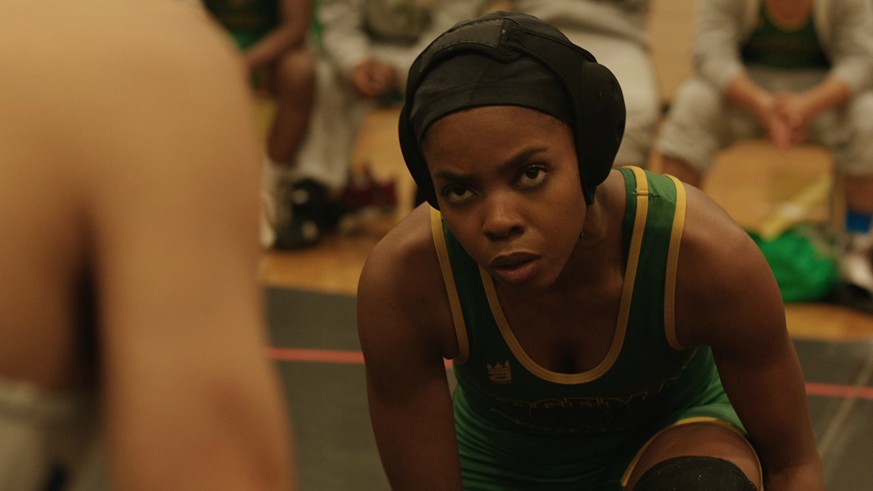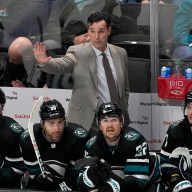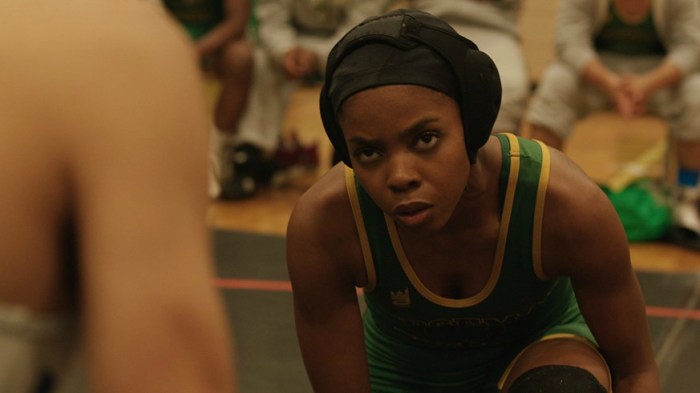First Match revolves around high school wrestler Monique’s (Elvire Emanuelle) battle in the ring against male opposition, who she routinely beats with ease, as well as her attempts to forge a relationship with her estranged father Darrel (Yahya Abdul-Mateen II).
It turns out that Olivia Newman, the writer and director of “First Match,” was involved in similar inner battles throughout the development and production on the film. Not only did she have to fight for the chance to tell this story in the male dominated cinematic field, but once she was given the opportunity to do so by Netflix she had to weigh up and the pros and cons of actually working with the streaming website.
I recently talked to Newman about the critically acclaimed “First Match,” its journey from a short film to her debut feature, and why independent filmmakers need to accept and embrace Netflix.
“First Match” was originally a short film, talk about its journey to feature.
I made the short film when I was a graduate at Columbia. Girls wrestling boys in high school was something I had been made aware of, and I became interested in who are these girls who want to do that. It had become a growing phenomenon, because there weren’t enough girls who wanted to fight.
Do you see yourself in Mo?
I was a little bit of a tomboy growing up. I wanted to play sports with my older brother all the time, especially because I was athletic. But I was never as good. So I think when I saw these girls taking down boys on the mat there was something really inspiring to me. Because they were underestimated but proved themselves, and I am in a field that is dominated by men. I am constantly having to prove myself and make sure that I am taken seriously and that the stories I want to tell are taken seriously. There is a little bit of Mo in me. I feel like I am constantly trying to be heard and seen.
Talk about making the wrestling scenes authentic.
All the wrestling scenes were choreographed with a trainer, who spent 5 weeks with Elvire. For all the wrestling matches in the movie, though, Elvire was paired with another wrestler so that they could carry the weight of the fight. The training was grueling for her, but Elvire knew all of the training choreography like a dance. In the end, we didn’t even need to use the body double too much because Elvire was such a natural athlete.
When did Netflix get involved?
Netflix financed the movie. We had spent a good year or so trying to raise money for the film. We were told at every turn that it was a very risky film to finance. But we had to make it at a budget level that was feasible, because there were so many stunts and fights and extras. People wanted us to make it for under $500,000. But I wasn’t going to make that movie. Because that would be a terrible version of that script. We needed a solid number. Because we had an all black cast, and no big names, it was hard to find financing in the traditional route. But then Netflix came in and gave us the financing just based on the merits of the script. They are not beholden to foreign sales and box office. They can just finance projects based on the story. They know they have a wide enough audience to find the specific viewers for anything. I didn’t go into this movie thinking it would be a Netflix film. But they gave me full control, and have been so supportive going into the release of it, we had a tremendous premiere at South By Southwest, all of which will hopefully help bring an audience to it.
It’s interesting that you say you didn’t go into the film thinking it would be for Netflix, did that then change your approach?
I am still adapting to this new model. Like any filmmaker I feel resistance. Because I want my movie to be seen on the big-screen with a community. But at the same time I also want my movie to be seen. And I know I will get more people watching the film on Netflix over a movie theatre. I still shot it thinking it would be on the big-screen, and that translates to the home viewing experience, making it the most beautiful sound and image possible. But this is definitely something I am having to come around to and learn about and accept. Especially if you’re a filmmaker that is telling nontraditional stories and have to find financing a different route, we have to be open to different platforms for people watching our movies.
Do you find it frustrating that there is such a resistance to Netflix?
It sucks when you hear that Cannes are no longer accepting Netflix movies. It feels like it is excluding … the independent film world is already shrinking because of box office numbers. Netflix keeps this kind of storytelling alive. It needs to be appreciated, not shunned. Because otherwise these films wouldn’t have got made. I don’t think that my film would have got made if it wasn’t for Netflix. And I think my film is just as important as “Ready Player One.” I hate that there is this value that is attributed to films being watched in theatre against online. Because I am probably going to get a million more people watching my movie than if it was released in a theatre. I think we are just in this weird space where the distribution model for independent films is changing and we as filmmakers have to accept it and embrace it and figure out how to work within it.
“First Match” will be released onto Netflix on March 30.
















